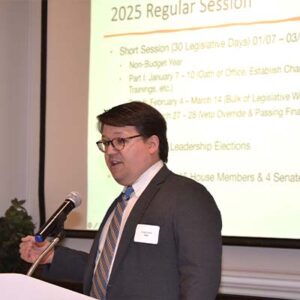The 2025 legislative session of the Kentucky General Assembly is upon us. This year’s legislative session is what’s known as the short session, or a 30-day non-budget session.
Lawmakers convened on January 7th and adjourned on January 10th, concluding Part I of the session. During this time, General Assembly members took their oaths of office, elected their respective caucus leadership, completed mandatory trainings, introduced legislation, and generally reacclimated themselves to Frankfort.
Despite the focus on organizational tasks during the first week, the General Assembly filed 201 bills in the House and 62 bills in the Senate. Notably, House Bill 1, which aims to lower the state personal income tax from 4% to 3.5% starting on January 1, 2026, has already been acted upon and passed out of the House. This bill is part of a multi-year, multistep effort by the legislature to phase out the personal income tax. We fully anticipate that the Senate will pass this bill early during Part II of the session and that the Governor will promptly sign it into law.
The General Assembly will reconvene for Part II on February 4th and remain in session until March 14th. This is when the bulk of the legislative work will take place, including numerous committee hearings, floor votes, and thousands of meetings with constituents and stakeholders. On March 14th, the General Assembly will adjourn for the veto recess and reconvene on March 27th to override any gubernatorial decisions that they disagree with. During this time, they will also finalize any pending legislation they wish to pass before the session’s adjournment. The General Assembly will conclude its legislative business on March 28th, with a mandatory adjournment by midnight.
In terms of healthcare legislation, the Kentucky Medical Association (KMA) anticipates an increased number of healthcare-related bills being filed. KMA will once again

advocate for prior authorization reform legislation, which would mandate insurers to offer an exemption program for physicians with a high volume of approved prior authorizations. Additionally, several non-physician providers will seek to expand their scope of practice. For example, physical therapists are seeking the ability to order imaging and physician assistants are interested in expanding their prescriptive authority to include Schedule II medications.
Other anticipated healthcare-related legislation includes the establishment of freestanding birth centers, vaccine regulations, changes to fluoride requirements in public drinking water, tax relief for organ and bone marrow donors, and many other issues.
As in most legislative sessions, this year promises to be very active on the healthcare policy front, and I encourage you to lend your voice to the process by contacting your legislators to let them know where you stand on the issues that are important to you. Additionally, please feel free to reach out to us at the Kentucky Medical Association and utilize our resources at https://kyma.org/advocacy/.



